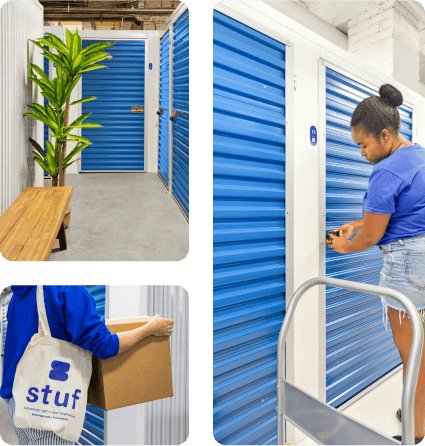Boxes stacked in hallways, overstuffed filing cabinets, inventory cluttering common areas - sounds familiar? While these nuances may be easy to ignore in the beginning, they can start cluttering your workspace and even hold back your operations.
Yet, expanding your lease or relocating can be costly and disruptive. That’s why an increasing number of small and mid-sized businesses are turning to business storage solutions as a smarter, more scalable alternative.
But here’s the catch: not all storage units are designed with business in mind.
In this guide, we’ll break down exactly what to look for, how to avoid common pitfalls, and how to match a storage solution to your business needs.
How Your Business Can Benefit from Having Extra Off-Site Storage
Getting a storage unit for your business means more than having additional space. It’s about creating operational breathing room that allows your team to work smarter, not harder. Dive deeper into the benefits of getting your own business storage below
1. Operational efficiency
When storage is intentionally separated from your workspace, workflows become
cleaner and more focused. Offices stay uncluttered, job sites become safer, and
employees can locate what they need without wasting time digging through overcrowded supply rooms.
For example, a start-up creative agency might use business storage to archive past project materials and seasonal decor, freeing up studio space for active campaigns. Meanwhile, small to mid-sized e-commerce businesses can use business storage units to hold inventory, packaging materials, and returns, allowing fulfillment to stay streamlined without interfering with office operations.
2. Flexibility during transition periods
Businesses often face periods of transition, such as moving offices, scaling up or down,
hiring new staff, or undergoing renovations. In these moments, a business storage unit acts as a buffer zone, absorbing the pressure of those changes.
For instance, real estate agents can use them to safely store staging furniture and
signage between showings. Meanwhile, service-based teams could use them to store equipment that isn’t needed daily but must be accessible on short notice.
3. Cost-effective alternative to leasing more commercial space
Leasing additional office or warehouse space comes with overhead:
-
Long-term contracts
-
Property maintenance
-
Utilities
-
Insurance
In contrast, business storage offers short-term flexibility and lower monthly costs, with units tailored to your size and access needs.
For small businesses and startups in urban areas like New York, San Francisco, Seattle, and the like, this can mean saving thousands annually while still maintaining access to the materials and inventory that drive revenue.
4. Improved asset protection
Modern storage facilities often offer security features far beyond what most small businesses can implement on their own. This includes:
-
24/7 surveillance
-
Climate-control
-
Gated access
-
Digital entry logs
This matters when storing sensitive documents, temperature-sensitive products, or high-value equipment.
5. Inventory management and supply chain organization
For retail, e-commerce, and wholesale businesses, storage units function as micro-distribution hubs. This helps in organizing inventory by season, product line, or sales region. When paired with inventory tracking software, this setup improves order accuracy, speeds up fulfillment, and minimizes loss.
6. Disaster recovery and business continuity
In some cases, having a secondary, off-site storage location protects vital assets in the event of a flood, fire, or data loss. Think of it as part of a business continuity strategy, where your tools, files, and backup inventory remain safe and accessible. 
What Is the Difference Between Business and Personal Storage?
Personal and business storage provide similar sizing options, however, their intended uses, features, and expectations are notably different. And while you can opt to use your personal storage for business purposes, it’s important to remember that you have to align your storage solution to the way your business operates to reap the benefits we mentioned above.
Let’s dive deeper into how these two differ:
1. Purpose and use cases
Personal storage is typically used for seasonal household items, furniture during a move, or belongings that no longer fit at home
Business storage, on the other hand, is designed to support operations. That might mean holding retail inventory, securing important files, staging equipment for field teams, or housing overflow stock for promotions and events.
2. Access needs
Businesses often require more frequent, sometimes daily access to their units. Some need multiple employees to access the unit at different times or even at multiple locations. This calls for features like:
-
Extended or 24/7 access hours
-
App-based entry or digital key sharing
-
Multiple access codes or user-level permissions
Personal storage typically assumes a single user and infrequent visits.
3. Security requirements
While both types of storage prioritize safety, business storage often houses sensitive documents, high-value items, or regulated materials, meaning the security stakes are higher.
-
24/7 surveillance with audit logs
-
Gated, access-controlled facilities
-
Commercial insurance compatibility
How Much Storage Space Does Your Business Need?
Choosing the right-sized storage unit for your business involves considering cost-efficiency, operational flow, and future-proofing. Too small, and you’ll be constantly reorganizing or upgrading. Too large, and you’re wasting budget on empty space.
The goal is to strike a strategic balance based on how your business operates. Here’s how:
1. Start with your inventory type and volume
Different business models require different types of storage. Take these businesses as
examples:
- E-commerce & Retail: Will you be storing bulk inventory, seasonal items, or fragile goods that need shelving and airflow?
- Service-Based Businesses: Are you storing tools, equipment, or client materials that need to be accessed frequently?
- Professional Services: Will the unit hold archived documents, office furniture, or technology assets?
The nature of your items can help determine the sizing fit for your needs and whether you need climate control, vertical storage options, or extra clearance for moving large items.
2. Estimate how much space you actually need
Here’s a general rule of thumb for choosing your unit sizing based on common business storage needs:
| Unit Size |
Best For
|
Approx. Fit
|
|---|---|---|
| 5x5 ft | Small archive, document boxes | ~35–40 file boxes |
| 5x10 ft | Inventory overflow, tools, equipment | Small office worth of items |
| 10x10 ft | Larger inventory or office furniture | Contents of 1–2 rooms |
| 10x15 ft | E-commerce fulfillment hub, equipment staging |
Palletized stock, multi-team use |
| 10x20 ft and up |
Warehousing, large equipment, multi-department use |
Commercial-scale storage |
3. Factor in accessibility
If you’ll be regularly accessing items, look for facilities with walkways, labeled shelving, and staging space. Cramped units may look efficient on paper but will create friction during day-to-day use.
Ask yourself:
- Will multiple employees need to be in the unit at once?
- Do I need to move stock in and out frequently?
- Will I be storing items temporarily or long-term?
Answering these questions will help determine whether you need a lean, compact
setup or an aisle-accessible layout with open zones.
4. Plan for growth
It’s tempting to size for your current needs only but if your business is seasonal or scaling, it’s wise to build in 15–25% buffer space.
Alternatively, choose a provider like Stuf Storage, which offers scalable unit options and makes upgrading seamless as your needs evolve.
Key Features to Look For in Business Storage Units
Selecting the right storage facility is crucial for businesses aiming to optimize operations, protect assets, and ensure flexibility. The following features are essential considerations, as each can
contribute to the efficiency and security of your business storage solution.
1. Robust security measures
Security is paramount when storing valuable business assets. Your chosen storage facility should offer:
- 24/7 surveillance cameras: Continuous monitoring deters unauthorized access and provides evidence in case of incidents.
- Electronic or digital gate access: Reliable storage providers like Stuf Storage provide personalized digital, keypad, or card access to ensure your valuables are accessible to you and other authorized members of your staff.
- Individual unit alarms: Alerts triggered by unauthorized access attempts enhance security.
- On-site security personnel: Presence of security staff adds an extra layer of protection.
These measures collectively safeguard sensitive documents, inventory, and equipment while providing you peace of mind knowing that your items are safe day and night.
2. A climate-controlled environment
Climate-controlled units maintain stable temperature and humidity levels, protecting sensitive items like electronics, documents, and artwork from damage.
These units typically keep temperatures between 55-85°F (13-29°C) and humidity levels between 30-50%, preventing issues such as warping, cracking, and mold growth.
They protect:
- Electronics and Machinery: Storing electronics in climate-controlled storage units prevents corrosion and malfunction due to moisture.
- Documents and Paper Goods: Climate-controlled units help avoid mold growth and paper degradation.
- Wooden Furniture and Instruments: These kinds of storage units prevent warping and cracking.
3. Accessibility and extended operating hours
For many business owners, their schedules don’t always align with traditional business hours. But facilities with around-the-clock and convenient access allow you the flexibility to retrieve or store items outside these standard operating hours.
So consider:
- 24/7 Access: Essential for businesses that operate beyond standard hours or require emergency access.
- Drive-Up Access: Facilitates easy loading and unloading of heavy or bulky items.
- Elevator Availability: Important for multi-story facilities to move items efficiently
4. Strategic location and proximity
Proximity to your business location can save time and transportation costs.Choosing a facility near major roads or delivery routes streamlines logistics, making it easier to manage inventory and fulfill orders efficiently. Additionally, nearby storage allows for quicker response times when accessing critical business materials.
5. Scalable unit sizes and flexible contracts
Opt for storage providers like Stuf Storage that offer a range of unit sizes and flexible contracts. This allows your business to scale storage needs up or down without incurring penalties. Such flexibility is also essential for accommodating seasonal inventory fluctuations or business growth.
6. Transparent pricing and billing
Understanding the cost structure is essential for budgeting for your regular business expenses. Look for facilities that offer:
- Clear Pricing: No hidden fees or unexpected charges.
- Flexible Payment Options: Monthly billing and various payment methods. Discounts for Long-Term Leases: Potential savings for extended commitments. At Stuf Storage, for instance, they offer seasonal, holiday, and first-time renter discounts.
Storage expenses may also be tax-deductible. However, consult with a tax advisor to understand the implications for your business.
7. Dedicated customer support
Effective customer support ensures a smooth and efficient storage experience, allowing you to focus on your core business activities. So, look for faciliies with:
- Dedicated Account Managers: Personalized assistance for your business needs
- Prompt Issue Resolution: Quick responses to inquiries and problems.
- Operational Support: Guidance on optimizing storage solutions for your
business.
Future-Proof Your Business with the Right Storage Strategy
Think of storage as an extension of your workspace. If it’s not secure, accessible, and scalable, it could slow your growth rather than support it.
So treat storage the same way you'd treat any other vendor relationship. Look for providers that offer service-level agreements, transparent pricing, and support for business-specific needs like multiple user access or commercial billing. And ask how often facilities are inspected, whether units are individually alarmed, and how they handle package deliveries.
Modern providers like Stuf Storage are responding to these needs with thoughtfully located, tech-enabled storage that caters to businesses, not just individuals. As your business evolves, your storage should keep pace
Find a location near you now!








